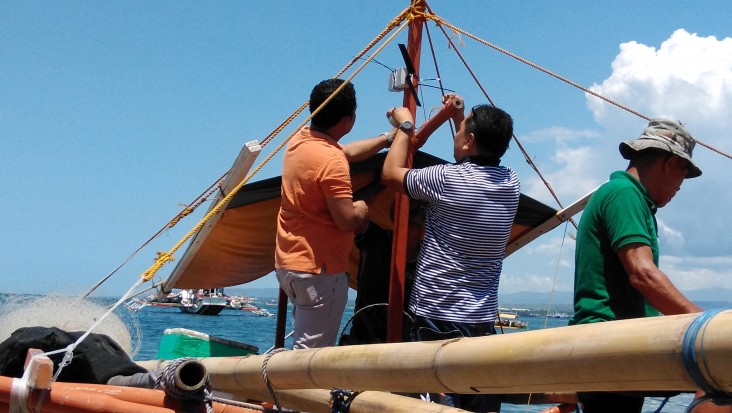Press Release Shim
Speeches Shim

For Immediate Release
BANGKOK – Marking World Oceans Month, the USAID Oceans and Fisheries Partnership (USAID Oceans) today launched a partnership with Futuristic Aviation and Maritime Enterprise, Inc. (FAME) to equip small-scale fishing vessels with transmitters to track catch data and promote sustainable fisheries in southern Mindanao, Philippines.
FAME, a Philippines-based technology provider, is deploying small-scale vessel monitoring equipment to fishers to capture and transmit key traceability data for the fish they catch, while also providing at-sea connectivity that increases fishing crew safety. FAME’s vessel transponders offer a solution for small-scale traceability that until now has been largely out of reach for most vessels due to high technology costs and limited connectivity.
“We are pleased to partner with innovative, entrepreneurial and home-grown companies like FAME that are meeting the needs of fisheries managers while also promoting prosperity and sustainability in the international seafood trade,” said Richard Goughnour, Director for the USAID Regional Development Mission for Asia.
The fishers working with USAID Oceans and FAME to pilot this technology are key participants in the Philippines’ famous tuna fisheries. Local pole and line fishing methods have been passed down through generations of fishers. Although one of the most sustainable methods of fishing, local pole and line fishers have historically been unsuccessful in reaching international markets due to their inability to meet documentation requirements. With the FAME technology, fishers can now more easily comply with national and international market requirements while benefiting from personal safety, communication and business features. In turn, global markets can access and reward sustainable providers, as well as protect their domestic markets from being undermined by illegal products.
With USAID Oceans support, more than two dozen fishers will receive and test their newly installed FAME vessel transponders this month in the waters off of three fisheries-driven municipalities along the southern coast of Mindanao island, Glan, Kiama, and Maasim. Fishers were recruited in collaboration with local government units and with the assistance of the Mindanao Association of Tuna Handliners. With their new equipment, the fishers will set out with the ability to capture key catch data via an easy-to-use catch documentation software application that enables them to easily meet stringent market requirements that ensure consumers receive legal, eco-friendly, properly labeled seafood products. Fishers will also be able to communicate back to shore through custom-designed messaging applications and an extended cellular network installed in municipal landing sites. Fishers’ family members and boat owners will also be able to track vessel locations through a live tracking function built for additional safety.
“For many years, vessel tracking technology has had numerous benefits for governments and non-governmental organizations, with far fewer direct and tangible benefits for the fishers themselves. FAME has worked hard to incorporate features into our transponders that benefit the fishers that use them,” said Arcelio Fetizana, CEO of FAME.
USAID Oceans and FAME are working together to explore how this technology can benefit other fishers throughout Southeast Asia and provide support to data-driven sustainable fisheries management. In addition to improving catch reporting, USAID Oceans strives to use FAME technology and the data collected to enhance sustainable fisheries management plans and improve livelihoods.
For more information, contact Richard Nyberg, USAID Regional Development Mission for Asia: rnyberg@usaid.gov

Comment
Make a general inquiry or suggest an improvement.